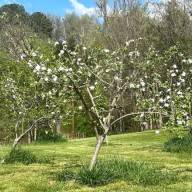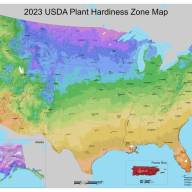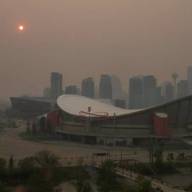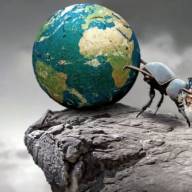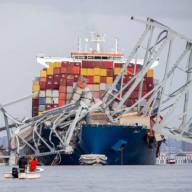From Phys.Org on 18 January 2024 comes a story headlined Report: Warmer planet will trigger increased farm losses. Here’s the lede: “Extreme heat is already harming crop yields, but a new report quantifies just how much that warming is cutting into farmers’ financial security.”
The paragraph continues with facts about crop yield and farm income: “For every 1 degree Celsius of warming, yields of major crops like corn, soybeans and wheat fall by 16% to 20%, gross farm income falls by 7% and net farm income plummets 66%.”
It’s no surprise that climate change is causing reduced productivity of food. After all, as I have reported previously in this space, the ongoing rate of environmental change exceeds that of any other time in planetary history. This includes the Mass Extinction Event that drove the dinosaurs and many other species to extinction about 66 million years ago when an asteroid struck the Yucatán Peninsula.
The findings of this report have significant implications for farms throughout the United States. Kansas serves as a relevant example for several reasons, including its high productivity of grains such as wheat, corn, and soybeans. The ability to grow, store, and distribute grains at a large scale serves as the basis for every civilization. So far, every civilization has required relatively cool conditions to enable the ability to grow, store, and distribute grains at a large scale. Kansas also includes relatively dry regions with growing conditions similar to western states in the United States. It also includes relatively wet regions similar to the Midwestern U.S. Finally, Kansas has yearly data of higher quality than most other states and regions.
Not surprisingly, the policy brief found that extreme heat events were rising significantly. In addition, the brief found that “increasing temperatures appear to have had a greater negative impact on growing conditions because of extreme temperatures than a positive impact through extending growing season length.” In other words, extending the growing season does not compensate for the negative impact of high temperatures.
Also falling into the category of not surprising is that the number of hot days in Kansas is projected to increase substantially in the near term, the medium term, and the long term. This finding does not bode well for farmers in Kansas, much less those of us who intend to eat in the days and years ahead.
Mitigation for those who grow food in Kansas and beyond is difficult to find. The primary tools listed in the policy brief include crop insurance, inventory sales, and alterations in irrigation. Crop insurance payments are likely to decline, rather than increase, as the United States government and major insurers fall further into financial disarray. The inventory of grains held by farmers continues to decline significantly as the region continues to heat up. Moving water from one place to another on the planet will prove increasingly difficult as the planet continues to warm.
Everyone needs water. Obtaining the amount of water necessary to support more than eight billion people is already proving challenging. I doubt this situation will improve as the planet warms and the interior of large continents continue to dry out.
Unfortunately, as explained by many scientists during the last half-century or more, we cannot have infinite growth on a finite planet. We are already exceeding the limits to growth described by the Club of Rome in 1972. If you are sufficiently fortunate to awaken every day unconcerned about your own access to food and water, then you are among the lucky ones.


